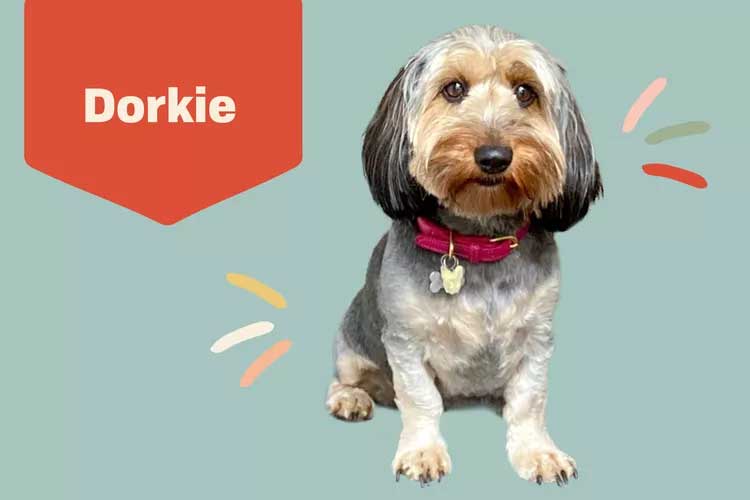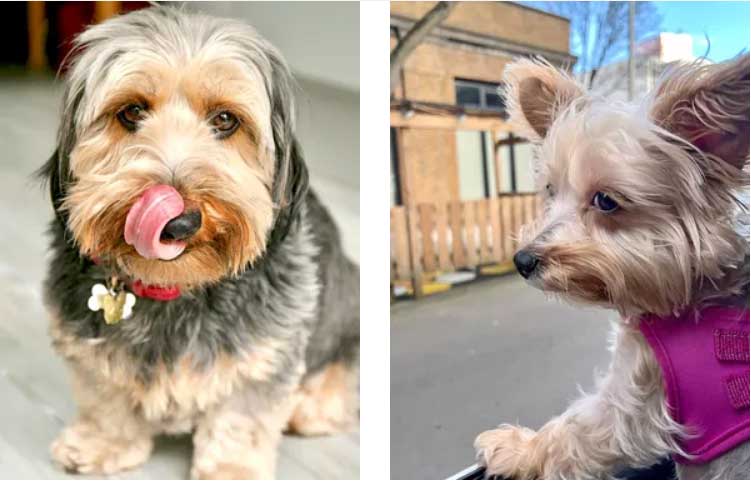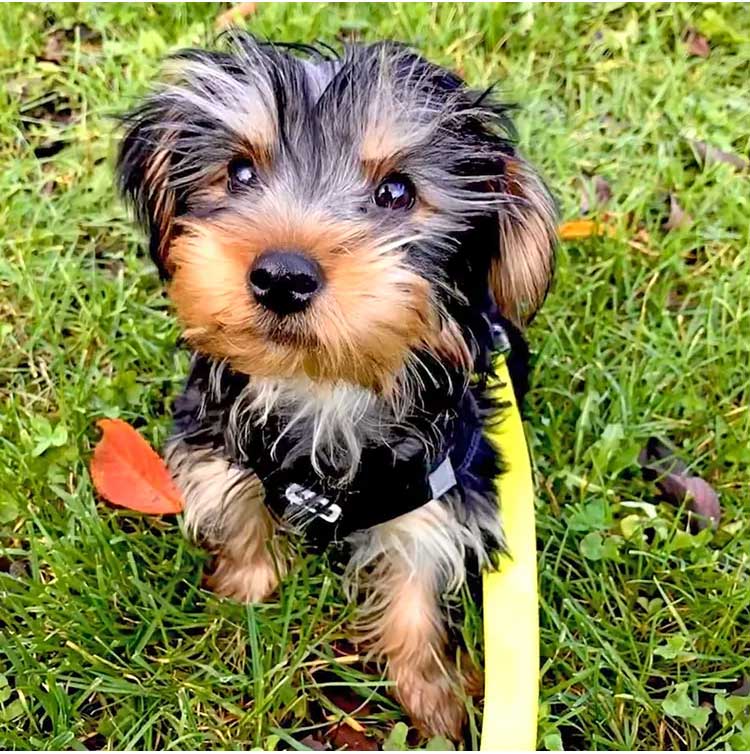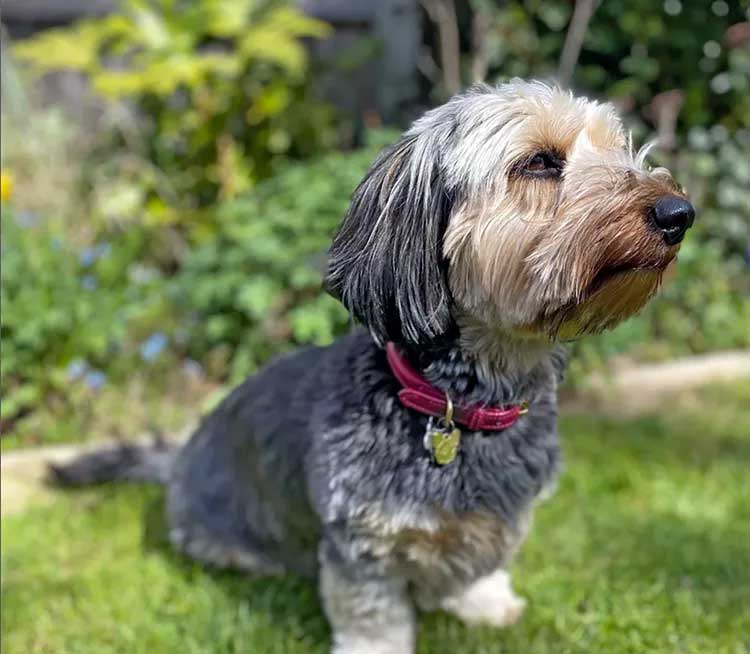Dorkies are a hybrid breed with dachshund and Yorkshire terrier parents. These small, smart, and loyal dogs are fit for apartment living and are playful companions.

Dorkie Overview
| OFFICIAL NAME | Dorkie |
| COMMON NAME | Dorkie |
| PET HEIGHT | 5 to 10 inches |
| PET WEIGHT | 5 to 12 pounds |
| LIFESPAN | 13 to 16 years |
| GOOD WITH | cats, dogs, families, seniors |
| TEMPERAMENT | anxious, friendly, outgoing, willful |
| INTELLIGENCE | high |
| SHEDDING AMOUNT | occasional |
| EXERCISE NEEDS | medium |
| ENERGY LEVEL | active |
| VOCAL LEVEL | frequent |
| DROOL AMOUNT | low |
| BREED GROUP | hybrid |
| BREED SIZE | small (0-25 lbs.) |
| COAT LENGTH | long, short, wiry |
| COLORS | black, blue, brown / chocolate / liver, cream, fawn, gold / yellow, red |
| PATTERNS | bicolor, black and tan, blue and tan, brindle, liver and tan, merle, saddle / blanket |
| OTHER TRAITS | apartment-friendly, easy to train, strong loyalty tendencies |
Sweet and affectionate, dorkie dogs are a hybrid breed with Yorkshire terrier and dachshund parents. Thankfully, these endearing, intelligent pups have enough cuteness and confidence to shake off having a silly name like dorkie! This emerging cross breed is also sometimes referred to as dorkier terriers and doxie yorkies.
"Dorkies fit in well with apartment and townhouse living," says Corinne Wigfall, DVM, BVS, BVM, and consulting veterinarian with SpiritDog Training. "They love the one-on-one time and will quite happily be a lap dog."
Petite playmates, dorkies tend to be a good match for a number of people, from families to retirees, and they adapt to most living situations so long as they get spoiled with attention. Because they're so tiny, dorkies are good candidates for apartment living, but these spunky dogs need playtime and a couple of short walks a day.
Appearance
Because dorkies are a cross breed, there's no "breed standard" that defines what these dogs should look like. Even dorkie puppies born in the same litter may look totally different. But each parent has some cute, signature traits that dorkie puppies could inherit.
Short and stout, dachshund dogs are nicknamed "sausage" or "weiner" dogs because of their stubby little legs that support a long, barrel-like body. Yorkies, on the other hand, are among the tiniest of terriers and wear their hair in long, glam, silky tresses or trimmed shorter into a cute "puppy cut."
When it comes to dorkies, the coat colors, patterns, and lengths can be all over the board. Dachshunds alone can have smooth, wire-haired, or long-haired coats in a variety of colors and patterns. Yorkies tend to have silky coats that come in color combinations like black and tan, black and gold, blue and tan, and blue and gold. Common coat colors for dorkies, though, include red, black, brown, and blue. Both parent breeds shed some and have low-to-moderate grooming needs.
But no matter what combination of traits they inherit, full-grown dorkies will always be a small dog. Dachshunds vary from 11–32 pounds while Yorkshire terriers are tiny dogs that typically weigh under 7 pounds. When these two breeds are crossed, the result is a pup that tends to be slightly larger than her Yorkie parent, landing between 5–12 pounds with a height that can vary between 5–10 inches.
Temperament
What is a dorkie dog's personality like? They may be teeny-tiny dogs, but they're big on personality. Yorkies are sprightly, tenacious, a tad bossy, and love cuddles. The spunky dachshund is brave and curious, traits that once helped these small, sausage-shaped dogs burrow into dens to flush out prey."The temperament for this breed is affectionate and friendly," says Amanda Cairncross, DVM, veterinarian for mobile veterinary service The Vets.

Dorkies can take to training well (despite their dachshund parent being known to be a tad strong-willed!) and, as with other dogs, patience, consistency, and lots of positive reinforcement are a recipe for dorkie training success.
As an active breed, dorkies love to play with interactive toys, their favorite humans, and other four-legged friends. As with every dog, early socialization will help bring harmony to a home with multiple pets.
But because of their delicate frame, dorkies may not be a good fit for a household with young, roughhousing children who could accidentally injure these little guys. Always supervise kids as they play with any pup.
Living Needs
As tiny dogs, dorkies feel right at home in smaller homes. Their motto: An apartment is their castle; your lap is their throne!While dorkies can live happily in an apartment, Cairncross says these dogs can be vocal, which is something to keep in mind if you share walls with neighbors.

Dorkies have tiny legs, so a couple of short walks a day in addition to regular potty breaks will do. While not distance athletes, they are playful puppers that love games of chase and fetch with their families.
Care
Dorkies have a lot of energy to burn off and are a playful breed, so bring on the interactive dog toys, balls, and tug ropes to keep your forever young-at-heart dog entertained.

When it comes to training, dorkies are fast learners and they'll enjoy training sessions because it's an opportunity to be the center of attention—and training can feel like fun and games to this playful hybrid breed. Come prepared with lots of treats to make sessions productive and fun. As with all breeds, exercise patience and use positive reinforcement during training.
The amount of grooming dorkies require depends on which parent influences the mixed breed's coat the most. These dogs could end up with a smooth, long, or wire-haired coat. But if a dorkie takes after the Yorkie parent, plan for daily brushing to prevent tangles and matting.

As part of their health and beauty routine, it's important that dorkies' teeth are brushed daily in order to prevent periodontal disease. Because both dachshunds and Yorkshire terriers are prone to dental problems, dorkies will likely require yearly dental cleanings to keep their pearly whites healthy, says Justin Padgett, DVM, associate veterinarian at Branchville Animal Hospital in Odenville, Ala., and a contributor to Pet Dog Owner.
Pup parents should also clean their ears a few times a month to prevent ear infections. Make sure their nails are trimmed and tidy, too.
Dorkies tend to be picky eaters, so you might need to try out a few dog foods before you find one they like.
Health
Dorkies can live long, healthy lives with typical lifespans of 13–16 years. While both the Yorkie and dachshund parents are prone to their own unique set of health problems, the Institute of Canine Biology says mixed breed dogs are generally less likely than their purebred parents to inherit genetic disorders. With that in mind, though, a dorkie can inherit some of the same health problems as his parents.Dachshunds and dachshund mixes are prone to intervertebral disc disease (IVDD) and other back problems, Wigfall says. IVDD can be a serious condition with symptoms that run the gamut from your dog having minor back pain all the way to paralysis that could require an emergency surgery. Pet owners need to make sure they don't let their dachshunds jump on or off the bed or furniture or in and out of cars because this is a common cause of slipped discs in the breed.

Yorkies, on the other hand, are disproportionately affected by portosystemic shunt, a liver disease. Dogs who suffer from this condition may exhibit symptoms such as swaying, loss of appetite, excessive urination, diarrhea, or vomiting, she says. This disease can be identified through testing.
To make sure you're working with an ethical dorkie breeder and that you're bringing home a healthy dog, be aware of these common puppy mill red flags when searching for a dorkie puppy:
A breeder offers to ship a puppy.
A kennel produces multiple breeds of dogs.
It's difficult to find contact information on a breeder's website.
The breeder will not let you meet the puppy's parents or siblings.
History
While dorkies are a relatively new hybrid breed that are gaining popularity, both Yorkshire terriers and dachshunds are popular dog breeds with long histories. It's hard to believe, but the ancestors of the adorable-as-can-be dorkies were quite the hunters centuries ago.
Yorkies originated in the northern English counties of Yorkshire and Lancashire in the mid-1800s, according to the Yorkshire Terrier Club of America. Before they were fashionable, Victorian-era lap dogs, they were hard-working rodent hunters that toiled away in textile mills and coal mines.
Before becoming household pets in the 1800s, dachshunds were also working dogs. These courageous hunters appeared some 600 years ago in Germany, according to the American Kennel Club. Their long, slender bodies and clever wit allowed the breed to dig and burrow into badger dens. (The name dachshund is made of two German words: dachs, meaning "badger," and hund, meaning "dog"). Packs of dachshunds were even used to hunt wild boar.
Fun Facts
Because they're a mixed breed dog, Dorkie puppies—even from the same litter—can look completely different with different coat colors and body types.Even though Toto was played by a Cairn terrier in The Wizard of Oz movie, the drawings from the first edition of L. Frank Baum's The Wonderful Wizard of Oz features a Yorkie.
Celebrity dachshund owners include actors Josh Duhamel and Emilia Clark, musician Adele, and artist Andy Warhol.